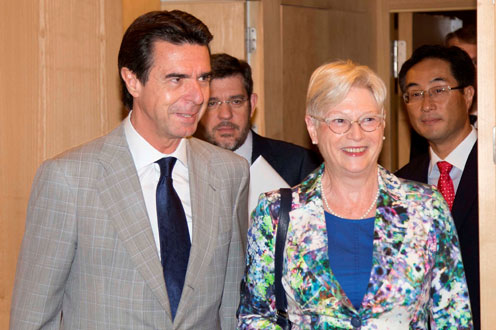Presentation of the "Energy Policies of IEA Countries - Spain 2015 Review"
International Energy Agency backs energy reforms undertaken by Ministry of Industry, Energy and Tourism
News - 2015.7.23
Earlier today in Madrid, the Executive Director of the International Energy Agency (IEA), Maria Van Der Hoeven, and the Spanish Minister for Industry, Energy and Tourism presented the "Energy Policies of IEA Countries - Spain 2015 Review", which reflects the result from an examination of energy policies that the IEA regularly conducts on its Member States.
Among other things, the report highlights that Spain has managed to reduce its dependency on imported energy from 80% to 70% since the previous review of Spanish energy policies in 2009, partly due to the rapid growth in renewable energies.
The IEA stresses that the size of the deficit accumulated in the Spanish electricity system led the Government of Spain to undertake a far-reaching reform of the electricity sector in 2012, which has enabled this structural problem to be resolved.
Furthermore, the IEA urges Spain to continue applying the principle of not allowing new costs into the system unless they are offset with the corresponding revenue in order to maintain balance and the economic and financial sustainability of the electricity system.
Moreover, and in relation to the gas sector, the IEA congratulates Spain on the measures adopted in 2014 to tackle the growing deficit in the gas system mainly due to a reduction in revenue stemming from the fall in demand in recent years.
The report underlines the high degree of supply security in Spain, both in terms of oil and gas, due to extensive import diversification and the country's significant storage capacity. As regards the Spanish gas system, it highlights the fact that Spain holds one third of total regasification capacity in the EU and the most diversified import structure in Europe. It supports the implementation of an organised gas hub in 2015 as a means to provide a national benchmark price and improve market transparency.
As regards electricity and gas interconnections, the IEA considers it necessary for Spain to increase its level of interconnection with the rest of the EU - especially France - in order to foster market integration, improve supply security and foster the integration of renewable energy. It recognises the importance of future political and economic support from the European Union in this regard when implementing these projects.
As regards energy efficiency, the report recommends that Spain should develop a long-term strategy mainly focusing on demand management and energy efficiency improvements capable of meeting the EU energy and climate targets for 2030, as well as incentives to foster a reduction in emissions and a transition towards a low-carbon economy. In this regard, it highlights the launch of the National Energy Efficiency Fund in July 2014 as an important source of financing for the development of actions in this area.





